e-Campus (Foreign Trade) EENI Global Business School
e-Campus EENI, e-learning platform (Master in International Business)
Study Methodology - EENI Global Business School.
e-Campus developed by EENI is an e-learning platform created with the objective to compliment delivered course materials and provide support for students throughout their studies.
At e-campus, student can ask questions, view articles of interest, participate in discussion forums as well as meet other students (networking).
When a student is registered for a course, diploma, master or doctorate; they will receive by e-mail the access codes to virtual campus.
e-Campus is organized into three main areas:
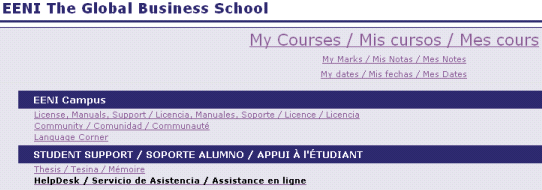
My Courses. Shows the subjects (learning units) that student is enrolled. Each course/subject (learning units) consists of:
A) EENI Unit: all course materials and activities of this subject provided by EENI.
b) EENI ALUMNI (Community for networking). In this area students can interact, share information, discuss about International Business topics or do networking. This part is open at the time, i.e., any EENI student can participate in this part, once finished their studies. Would be like lifelong learning/continuous education classroom.
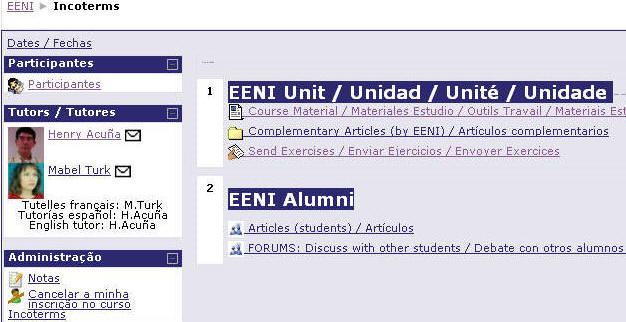
Each course is organized in the following way:
Course (Learning) Materials. These are the materials that the student needs to download from the e-campus to study. It is unnecessary to be connected to Internet to study (the instructional materials are on the student's hard disk). The student can print all materials.
An example of Incoterms course materials:
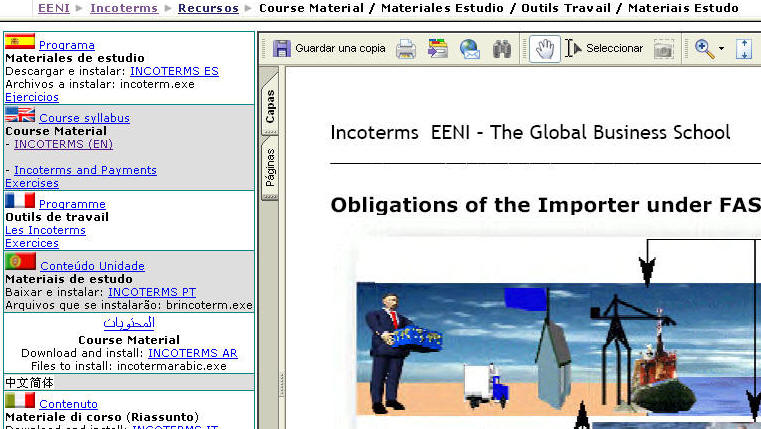
Complementary Articles. This section contains articles and resources related to issues discussed in the subject. These articles are provided to complement and provide a further understanding of what has been covered in the subject. Reading these articles is obligatory. Sometimes a Professor can initiate a discussion topic relating to an article. For example:
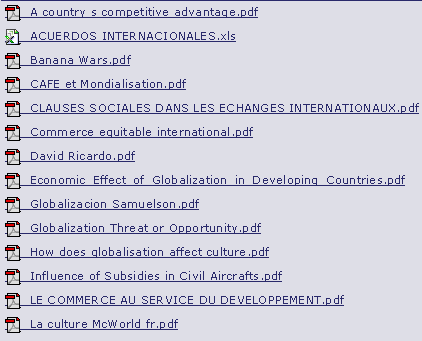
Student questions (Ask the Tutor).
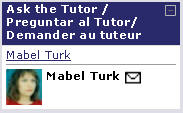
Students can post a private message to their professor and receive the response in the same way.
Please feel free to ask your questions (and about what support Professors can offer). Remember that a good relationship with your Professors can be an invaluable source of support.
Be clear and concise writing up your question. Put in a context that Professors can understand.
Normally the answer time is between 24 and 48 hours; nevertheless, if the question is complex, the Professor can need more time to respond. Also, consider the time differences between the countries, local holidays, in the case of delay.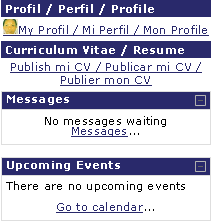
Send exercises. This is the section where students send their exercises that are to be evaluated by the professor. It is possible that the professor may consider that the student has not reached the minimum level to pass the unit. In this case, the professor will guide the student so that the material is reviewed and that the exercises are re-done. The important thing is to learn!
Students should expect to dedicate a minimum of 12 hours per week working on lessons and assignments.
The course assessment is based on
- Successful completion of exercises
- Student's participation (e-campus forums, questions, activities...)
- Thesis (only for Masters of Science / Doctorates).
1- Create a Word document and write all the answers to all exercises of the subject.
2- Upload the document to the e-campus using this form:

The system will upload your document to e-Campus server. E-Campus will send an email to Professors. Normally Professors need one week to evaluate an exercise.
When the tutor has evaluated the exercise, student will receive a message with the score and comments. If the teacher feels that the student has not reached the minimum level required, he will guide the student in order to improve the quality of their exercises.

The purpose of these exercises is for the student to work on practical cases and try to solve them efficiently. These exercises are obligatory.
The e-Campus interface is available in English, Spanish, French, Portuguese, Russian, or Arabic. The e-Campus has over 5,000 items of content online in various languages. Students can access to all these multilingual contents.

Course: AI for Global Business
Other e-Campus modules.
- FAQ's. This section contains the most commonly asked questions and answers related to the subject, such as explanations of terms, etc.
- Online Library. This is an e-campus resource library and search tool to help you find particular information in the e-campus. Just enter your search
query and click “Search” to view the results.
- e-Campus events. Every time you access e-campus; we advise you check the “e-Campus Events.” The Professors and students edit this section and its purpose is to inform the student of upcoming events, which can take place either on the e-campus or at a physical venue. This subsection is very dynamic as it displays up-to-date information on what is happening in the e-campus itself and other events related to the courses.
- Online Chats. On certain days your Professors will be available for consultations (check the “E-campus events” for exact dates). To make the planning of consultations more effective; it is essential that you confirm to your Professor your wish to participate in a chat at least twenty-four hours before the event. Also, you can contact by chat with other students. Also; we recommend to use Yahoo Messenger.
- Other Tools. Here is some useful information for you, such as World news, tax information and some helpful little tools, such as converters, weather search, mini dictionaries, etc.
- Publish My CV. Each student has his Curriculum Vitae (resume) (CV). EENI has developed the CV Rank project.
(c) EENI Global Business School (1995-2025)
Top of this page











 WhatsApp
WhatsApp

